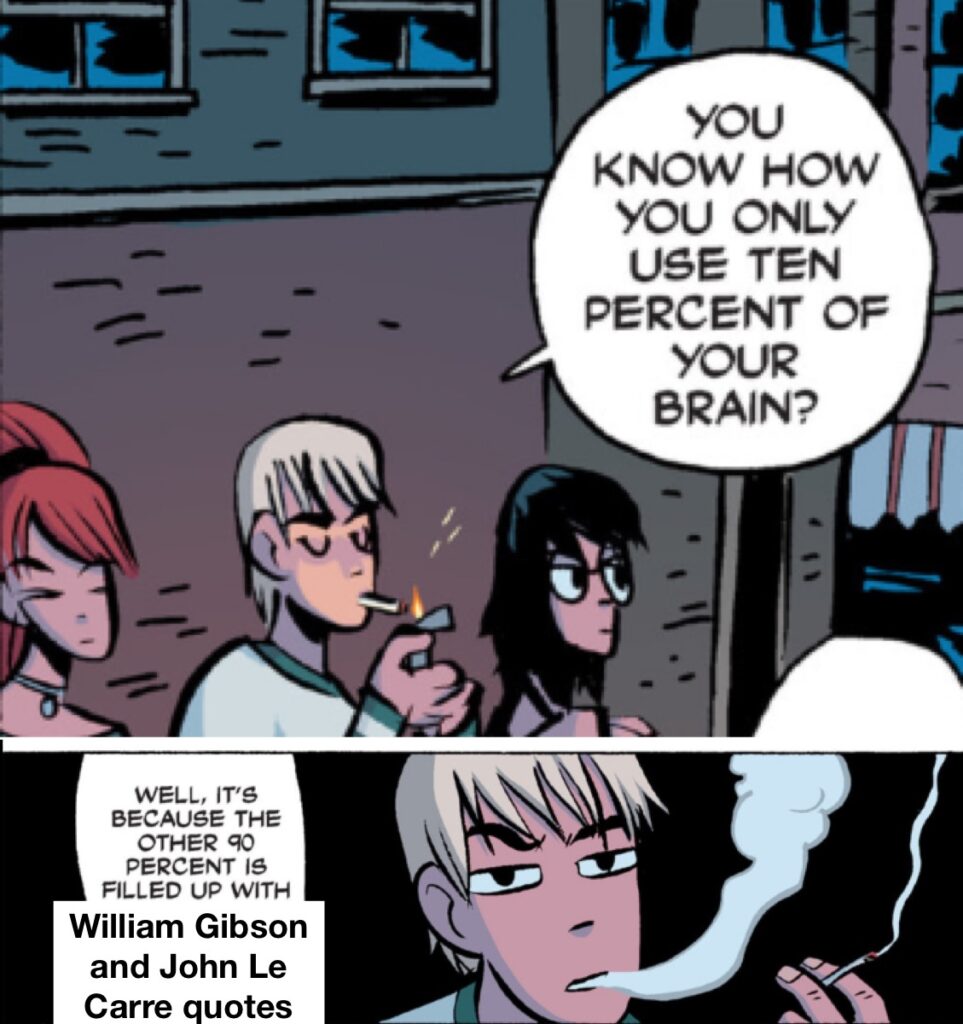A lot of these are on YouTube, so if you are not a fan of YouTube, you should skip those. But it’s a hard world out there, and videos are some of the things that help divert me from ruminating on matters I can’t control.
- For instance, Tico and his Man are a beautiful example of what can emerge from surrendering to inspiration and letting an enigmatic artist follow his unknowable muse, especially if that artist is a parrot.
- I also feel a great freedom in having given up on Connections and replaced it in my mornings with friendlier puzzles. Cine2Nerdle has possibly the worst Wordle-derived name anyone has yet produced, but it does exactly what I wanted from Connections in terms of interface and hinting, and it’s about movies! (Don’t even talk to me about Cinematrix, I can’t stand it.)
- The NYT web games team can still do good work, though. Strands has actual hints that can be earned through play (not that they’re often necessary—its challenge level varies, but tips toward the easier side). But the first few minutes of looking at a new day’s grid, waiting for my pattern-recognition neurons to wake up, are a consistent if brief instruction in patience.
- But back to videos. I found Brad the Tech Time Traveller’s channel algorithmically—I think his literally-bricked hard drive documentary was what first caught my attention. I love to wind down in the evening by watching him work, and he also has a blog which ably demonstrates his time-travel credentials by skillful use of a <marquee> tag.
- I’ve played a number of games set in the milieu of the Romance of the Three Kingdoms, but I’ve never actually read the original novel. I could just try that—the work is very much in the public domain—but these days I find it easier to digest fiction via audio. So when I want to occupy one hemisphere of my brain with Minecraft, I occupy the other with the podcast that motivated me to make this post in the first place. John Zhu originally started his Romance of the Three Kingdoms Podcast a decade ago, going through the book chapter by chapter in a kind of ongoing summation abetted by his own commentary and context. I find his work so charming and affable, and generous with explanations for a naive audience member like myself. Zhu has gone on to cover other works of similar import under the umbrella of The Chinese Lore Podcast. I’m almost a quarter of the way through the 174 (!) episodes of the original, so I’m very glad there will be more to listen to when I get through all of those.
- Oh, also I still play Minecraft (and of course I still watch Joe). I got back into the game when my nieces and nephews became interested, and then they got kind of bored of trying to coordinate with me long-distance. I kept playing anyway. I can’t play it with joysticks at all, which rules out my Switch, and my laptop is a little unwieldy for games, so I’ve been playing the Bedrock version of the game on my tablet with a bluetooth mouse. I miss being able to mod the Java version but I don’t miss having to sit at a desk to play it. I have a nice little world going now, featuring such wonders as a villager who sells mending books and also a square chunk hole that I dug one block at a time from a mountaintop to the bottom of the world. It’s just a solo local file, but if you are a friend who would like to play in it, email me and I will click the button that makes it a server.
- This is becoming more about video games than I expected. I can’t play Minecraft on our elliptical, so to occupy that version of my brain, I use a secondhand tiny piracy machine to play a randomized version of Final Fantasy III (6) called Worlds Collide. It’s promoted mostly as a racing game—the community holds regular tournaments where competitors all start with the same seed and try to be the first to beat the final boss. I have played through probably twenty times now and I must accept that I will never, ever be fast enough to compete in even the introductory qualifiers. But the scope of the game and my own teenage familiarity with it are juuust right to make it a fun puzzle with many possible solutions every time.
- Let’s go back to the part where I’m bad at reading books! It took me an undisclosed amount of time to finish Roaming, because at first its illustrations of youthful personality interplay were too acute. But I barreled through the back half and loved it, as I do everything by either of the Tamaki cousins. I was spurred on in no small part by the chance to participate in my first ever Zoom-based book club meeting, a privilege of my subscription to Sophie’s wonderful newsletter. It was a treat! Sophie always has excellent book recommendations, and has since motivated me to get my heart broken by a whole different graphic novel.
- And speaking of paid subscription privileges, ACHEWOOD IS BACK, BABY.

- I made the above visual goof in a few minutes on my phone with Mematic, which is kind of a silly app to pay for given how much image-editing software I already own. But I like how easily it allows me to make little jokes to show my friends in small amounts of time.



- I loved getting to see Lucy’s collections of studio dances!
- I continue to enjoy, above all else, being married to Kat.

- There’s just one more YouTube link left in this blog post. But I promise I saved it for last for good reason.

